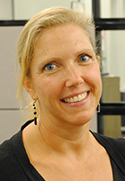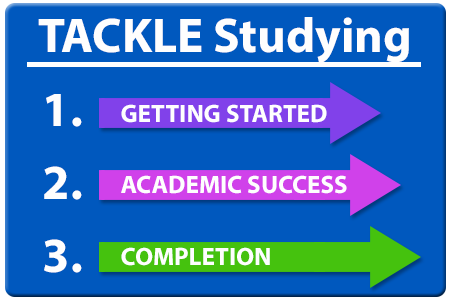It's Time to TACKLE Studying!
Take Action and Connect to Key Learning strategies to Excel.
TACKLE Studying is designed by our expert student success navigators and is perfect for any student, whether you're just getting started or struggling to get through this semester. On this studying success page we have included resources you can browse for assistance and learning opportunities.
Download our TACKLE Studying toolkit, and access valuable resources by or tapping the links found in the tool kit document.
Managing the demands of college while dealing with the ups and downs of day-to-day life can be challenging, whether you are a first-year student, transitioning from high school, a transfer student, a continuing student, a first-generation student or a returning student. Being a college student means you must quickly adapt to the demanding workload of an academic semester all while dealing with new routines, new people and different responsibilities. This balancing act can be challenging. Luckily, you do not have to balance these demands alone! Our student success navigators share their reflections and favorite study skills below to help you stay anchored!
 Study skills is a big umbrella term actually and it's so important because every student needs to know what to study, how to study, and when to study to achieve academic success! Without our study skills we cannot know what we are learning and how well we are applying this new knowledge. Part of Tackle Studying Toolkit is about exploring how study skills encompass so many aspects of college. Everything you do before class, in class, and after class make up study skills, which, is why my favorite study skill tip is the study cycle. Dividing your study responsibilities into smaller review sessions that focus on an intense review and reflection while breaking for 5-10 minutes makes for a more effective and direct study experience! You can find more about the study cycle under the study skills section of the Tackle Studying chart.
Study skills is a big umbrella term actually and it's so important because every student needs to know what to study, how to study, and when to study to achieve academic success! Without our study skills we cannot know what we are learning and how well we are applying this new knowledge. Part of Tackle Studying Toolkit is about exploring how study skills encompass so many aspects of college. Everything you do before class, in class, and after class make up study skills, which, is why my favorite study skill tip is the study cycle. Dividing your study responsibilities into smaller review sessions that focus on an intense review and reflection while breaking for 5-10 minutes makes for a more effective and direct study experience! You can find more about the study cycle under the study skills section of the Tackle Studying chart.
 The best study tip I have is to optimize your study time, so you can optimize your rewards. It is also important to have a good time management plan so you can be focused on your work and be efficient. Time management skills will allow you to be able to enjoy and take advantage of your downtime. I host a TACKLE MATH program for students who want to build math skills and confidence before taking their math class at Lakeland, or alongside it to practice math skills they're learning. In both Tackle Math and the women's center math empowerment group I talk more about time management plans (both monthly and weekly) and studying in smaller chunks.
The best study tip I have is to optimize your study time, so you can optimize your rewards. It is also important to have a good time management plan so you can be focused on your work and be efficient. Time management skills will allow you to be able to enjoy and take advantage of your downtime. I host a TACKLE MATH program for students who want to build math skills and confidence before taking their math class at Lakeland, or alongside it to practice math skills they're learning. In both Tackle Math and the women's center math empowerment group I talk more about time management plans (both monthly and weekly) and studying in smaller chunks.
 Study skills are really all about metacognition, or being able to think about the way we think. When we are cognizant of how our brains work and retain information, we begin to see the difference between actual learning and when it occurs, and mere rote memorization and just going through the motions of what we consider "studying" to be. It's all about awareness and practicing reflection. Bloom's Taxonomy is an especially helpful tool in this regard because it lays out the different levels of learning as a reference tool: Remembering, Understanding, Applying, Analyzing, Evaluating and Creating. Students can use Bloom's when reflecting on how well and to what degree they've mastered any concept, problem or subject matter.
Study skills are really all about metacognition, or being able to think about the way we think. When we are cognizant of how our brains work and retain information, we begin to see the difference between actual learning and when it occurs, and mere rote memorization and just going through the motions of what we consider "studying" to be. It's all about awareness and practicing reflection. Bloom's Taxonomy is an especially helpful tool in this regard because it lays out the different levels of learning as a reference tool: Remembering, Understanding, Applying, Analyzing, Evaluating and Creating. Students can use Bloom's when reflecting on how well and to what degree they've mastered any concept, problem or subject matter.
Remembering information will only get you so far, therefore, one of my favorite study tips is to study not just to pass a test, but as if you had to actually give a presentation on the material to the whole class. This goes beyond being able to recall and recognize ideas and definitions – you are the expert. It requires getting to the very top of the learning pyramid and possessing a deeper knowledge of the material, so that when those tricky test questions pop up on an exam that require you apply, reorganize or make judgments on a concept, you'll be able to tackle it head on with confidence"
- Placement Test Information & Scheduling
- Prepare for the Placement Test
- FAQ
- Test Center
- Student Success eNewsletter
- Schedule your tutoring, writing center or academic skills study session
- Student Success Navigators
- Women's Empowerment Math Tutoring [.PDF]
- Tips & tools for students
- Writing Center Handouts
- TutorOcean eTutoring


